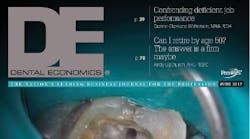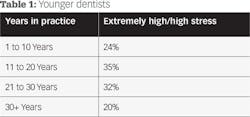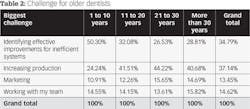The survey results that keep on providing insight
Roger P. Levin, DDS
Our team at the Levin Group Data Center continues to dig into the data from last year’s Dental Economics-Levin Group Practice Survey. Recently, we looked at a number of key questions as they relate to years in practice, which we divided into four categories:
1. Younger dentist—one to 10 years of experience
2. Midcareer dentistI—11 to 20 years of experience
3. Midcareer dentist II—21 to 30 years of experience
4. Older dentist—More than 30 years of experience
The answers we found will surprise many of you. Here are three takeaways based on our research.
Younger dentists aren’t that stressed out
Well, at least younger dentists are not stressed out at the same levels as midcareer dentists (table 1). You would think that carrying student loans in excess of $200,000, coupled with the additional financing needed to buy or start a practice, would make the majority of younger dentists super stressed. You would be wrong.
In fact, only 24% of younger dentists said they were experiencing high or extremely high stress, compared to 35% of midcareer dentists I and 32% of midcareer dentists II. Why are these doctors significantly more stressed than their younger counterparts? On the face of it, it seems counterintuitive. Midcareer dentists are in the prime of their high-earning years. They should be reaping the benefits of decades of hard work and enjoying high-functioning, high-profit, low-stress practices. But that doesn’t seem to be happening for a lot of dentists.
If you look beyond the conventional wisdom, I think you’ll see that midcareer dentists are in a very tough position. They joined this profession in the prerecession era, a golden time of easy practice growth and rising dentist incomes. They remember “the good ol’ days,” when more patients had dental insurance, patient loyalty was stronger, there were fewer corporate practices, insurance reimbursements were higher, and competition for new patients was less intense.
Sure, there were challenges, but it was far less complicated to own and operate a successful dental practice. In the aftermath of the recession, the business of dentistry has become much more complex. Dentists need more business skills and knowledge than in the past to grow a practice and successfully compete in a crowded dental market.
Also, midcareer dentists have older practices. That can be a competitive advantage in terms of having an established patient base and being well-known in the community. On the other hand, the majority of older practices suffer from what I call “aging infrastructure” - they have equipment, facilities, and management systems that need to be upgraded or replaced. In the midst of increased competitive pressures, it can be extremely difficult to plan and oversee major improvements to one’s infrastructure.
So, yes, I understand why a third of midcareer dentists feel highly stressed.
The biggest challenge for older dentists is figuring out how to increase production
You would think that this issue would disappear after practicing for more than 30 years, but even at this stage dentists are looking for ways to grow their revenue (table 2). Of course, older dentists want to have their practices in the best possible shape when they prepare to sell. They don’t want to put their practices on cruise control for their last five years and see all the progress they made erode as they approach retirement.
Older dentists are faced with the loss of loyal, long-time patients to health-related issues and even death. Attracting younger patients can be difficult because they may not want to join a practice where the dentist might retire in a few years, or they might prefer an office with a doctor from their own generation.
Overhead is the elephant in the room for everybody, regardless of experience
The Levin Group target for general practitioner overhead is 59%. None of the groups came in at that level (table 3). At 66.75%, midcareer dentists II had the lowest overhead, but still nearly eight percentage points higher than Levin Group’s recommended mark. In a time of increased competition and lower practice growth, controlling overhead is one of the best strategies for maintaining and increasing profitability. Reducing overhead by even a few percentage points can result in significantly more profit and take-home pay for the doctor. For example, if someone were able to reduce overhead by 3%, he or she would save $3,000 per $100,000 produced. If a practice’s revenue is $600,000, a 3% reduction in overhead would yield an additional $18,000 in profit.
Conclusion
No matter where you are in your career, you face the challenges of reducing stress, growing production, and controlling overhead. That’s the nature of dentistry. These challenges won’t magically go away, but they can be addressed and overcome with the right management and marketing solutions.
Editor’s note: Attend Dr. Roger Levin’s all-new seminar. Learn the latest practice-building strategies from dentistry’s most sought-after expert. See the complete seminar schedule at levingroup.com/gpseminars.
Roger P. Levin, DDS, is the founder and CEO of Levin Group Inc., a leading dental consulting firm. A nationally recognized speaker, Dr. Levin presents practice management seminars throughout the country.



